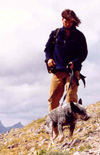 |
Justin Searns |
At just 21 years old, Justin Searns is already a world traveler. But not just for fun and adventure. Justin is pursuing a career as a doctor, and his 2005 trip to Kenya was to learn about health care issues in Africa, and the involvement of foreign medical organizations. He contacted the School for International Training (SIT), and participated in their Health and Development, Independent Study Program for World Learning.
His first two months were spent in Nairobi, to learn Kiswahili and become immersed in the culture. He and a small group of other students from the SIT program stayed with local volunteer families there and also visited a small village near Mombassa. Justin found many opportunities to learn from his hosts, and the program gave great freedom for experiential learning. When his group met for “classes” they visited non-governmental organizations (NGO’s) that were stationed in the area. During this time Justin was expected to develop a question, find a study site, and get approval for his proposed budget.
Justin chose to work with an international organization called Doctors without Borders. It is the US part of a French organization called “Medecins sans Frontieres” (MSF). In November they approved his proposal and budget for a month’s study in Homa Bay, Kenya. His questions addressed the ethical problems associated with pro-bono healthcare in a foreign country:
Did the Kenyan people feel like the foreign efforts were condescending?
Would it make local doctors feel inadequate?
Would people become dependant on medicine and care from foreign doctors who would not be able to stay there permanently?
Kenya has a low percentage of AIDS victims compared to many other sub-Saharan countries in Africa. In Kenya, 7-15% of the population has AIDS, but the highest concentration is in a part of Homa Bay, a province near Lake Victoria in the Suba District, where AIDS afflicts 42%. MSF had established an AIDS clinic there to assist the local people.
Justin stayed with a caring Kenyan family who lived near the MSF Clinic. Monica Ouma (affectionately known as Momma Monica) was a professor who taught clinical work to local nurses. She has four children ranging in age from teenagers to young adults. Behind their modest abode, they grow a small maize crop and have a chicken coop.
During his time in Homa Bay, Justin used interview techniques to answer his questions about the ethics of foreign medical organizations. He interviewed nurses, doctors, and patients from both the local hospital and at the MSF clinic, and followed doctors during their rounds. He spoke with religious leaders, people on the street, and with representatives from the Ministry of Health. At the end of a month he had spoken with enough different people to learn the answers to his questions.
The first question was about feelings of condescension. The Kenyan people were appreciative of the foreign health care assistance, and did not feel like they were being looked down upon. They definitely felt the long term benefits to having the NGO’s helping with the AIDS crisis.
“Even if you are not infected, you are affected by MSF’s work,” said one Homa Bay resident.
The second question was if the local doctors felt inadequate by the presence of the foreign NGO’s. Justin found that local doctors had felt inadequate before MSF arrived. With governmental issues over finance, they had been underfunded and overworked. Now with MSF they have access to better medical supplies, logistical support, and technicians. With more resources than before, they are just happy to be better able to help their own people.
The third question was if a dependency had formed. The answer was yes, most people didn’t know what they would do without MSF, others worried that they would die. MSF has anticipated this type of dependency and tried to develop a “catalyst for change” plan to revamp local systems. The transfer process is slow, but in 10 years when they leave, they hope to leave a more sustainable local system in place.
Justin left Homa Bay feeling that if this program is still operating after he graduates, he would like to return and work there as a doctor, instead of only being able to watch and investigate. He took the bus back to Nairobi and rejoined the other students from his program. They stayed in a nunnery for the last week in Kenya to write their research papers. Then as the new year of 2006 began, Justin returned to the UW Department of Biology to continue his studies with increased motivation to become a “doctor without borders” himself, and help make a difference in the world.
Photo from J. Searns



 Together this dog and his trainer, Heath Smith, search for sign from grizzlies in Alberta, Canada. They are part of a novel and non-invasive animal tracking program started at the Center for Conservation Biology. This program is one of several at the department that conducts research to help save the lives of endangered species.
Every bit counts. Your choice to support the Department of Biology could make a big difference in how our future turns out.
Together this dog and his trainer, Heath Smith, search for sign from grizzlies in Alberta, Canada. They are part of a novel and non-invasive animal tracking program started at the Center for Conservation Biology. This program is one of several at the department that conducts research to help save the lives of endangered species.
Every bit counts. Your choice to support the Department of Biology could make a big difference in how our future turns out.